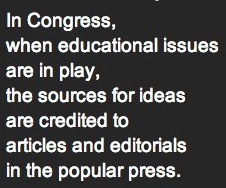By Peter Smagorinsky
When I began my doctoral studies 30 years ago, among the first lessons impressed on me was the higher purpose of scholarly writing and the “life of the mind.” Writing for newspapers, I was told, was for journalists, not scholars. The public debate is too ignorant, too trivial, and beneath the scholarly enterprise. Rather, our goal was to produce work of enduring value, even if its merits might not be evident for years, decades, or generations.
That value stayed with me for quite some time as I earnestly, and I hope positively, dedicated my writing to the academic sphere. My task was to work within the confines of the gold standard for scholarly achievement, the refereed journal article, and to produce books and book chapters for academic presses. On the whole, I have remained faithful to this value system for the nearly three decades in which I have written for scholarly publication.
At the same time, I have changed quite a bit in my thinking about the scholar’s role in the public domain. My realization came about quite by chance when I served on the Communication and Outreach Committee for the American Educational Research Association.
The major task of our committee during our early meetings was to plan an AERA conference session around our purpose of making scholarship more widely available and influential, and we decided to organize a session around the topic of writing in the op-ed medium in the public domain provided by newspapers, magazines, and blogs. Throughout this provocative session I began to question my own role in the field, especially as a member of the committee who sponsored this session. How could I advocate for such work on this committee without taking on this role in my own work?
This question began to bother me increasingly during the give-and-take of the session and in the months following. I began to take much greater notice of how policy is constructed, and it’s not based on what academics say in refereed journal articles. Rather, the policy debate follows from what is available in the currents of the public domain. In Congress, when educational issues are in play, the sources for ideas are credited to articles and editorials in the popular press. State-level policy is determined in much the same way. Meanwhile, I had to acknowledge that just about nothing I’d ever done had ever influenced educational policy at any level.

In the summer following the AERA meeting in which we had held our session on public writing, I was visiting one of my sisters, herself a middle grades mathematics teacher in New Jersey after retiring from a career with the various entities of the Bell telephone conglomerate. Her son was close to completing high school and was thinking of going into teaching. I hope he doesn’t, my sister said; it’s a very unrewarding profession. Wow, did that bother me—not because I thought any less of my sister, whose conscientious approach to her job occupies her all weekend and for much of each summer, but because such a dedicated teacher would not wish her profession on her own son.
That feeling of discouragement began to eat at me. In conjunction with the dissonance I felt from not having entered the public fray to this point, my discontent led me to the keyboard, where I composed my first op-ed essay, which I sent to Maureen Downey’s Atlanta Journal-Constitution Get Schooled blog. Instead of waiting 2 years for a submission to appear in print, I sent her the essay on one day, and it appeared the next. It’s a refreshing change for those of us accustomed to the elephantine pace of the scholarly review and production process. For the highly topical public debate, that sort of turnaround is key to providing relevant content to readers, and it’s one reason that public forums like this blog are important.
In Part II of this essay, I’ll suggest ways for others to begin writing for the public, with the hopes that I help others make their voices heard in the broader cacophony of the public debate about education.
Peter Smagorinsky is Distinguished Research Professor of English Education at The University of Georgia. He is the recipient of the Sylvia Scribner Award from AERA in 2012, and at the 2013 NCTE Convention will be presented the David H. Russell Research Award for Distinguished Research in the Teaching of English for Vygotsky and literacy research: A methodological framework.

.gif)
Pingback: Carpe Diem in the Public Sphere, Part II | Teachers, Profs, Parents: Writers Who Care
Pingback: What, Me Blog? | the becoming radical
Pingback: Blogiversary: Reflections on the First Year and Plans for Next | Teachers, Profs, Parents: Writers Who Care